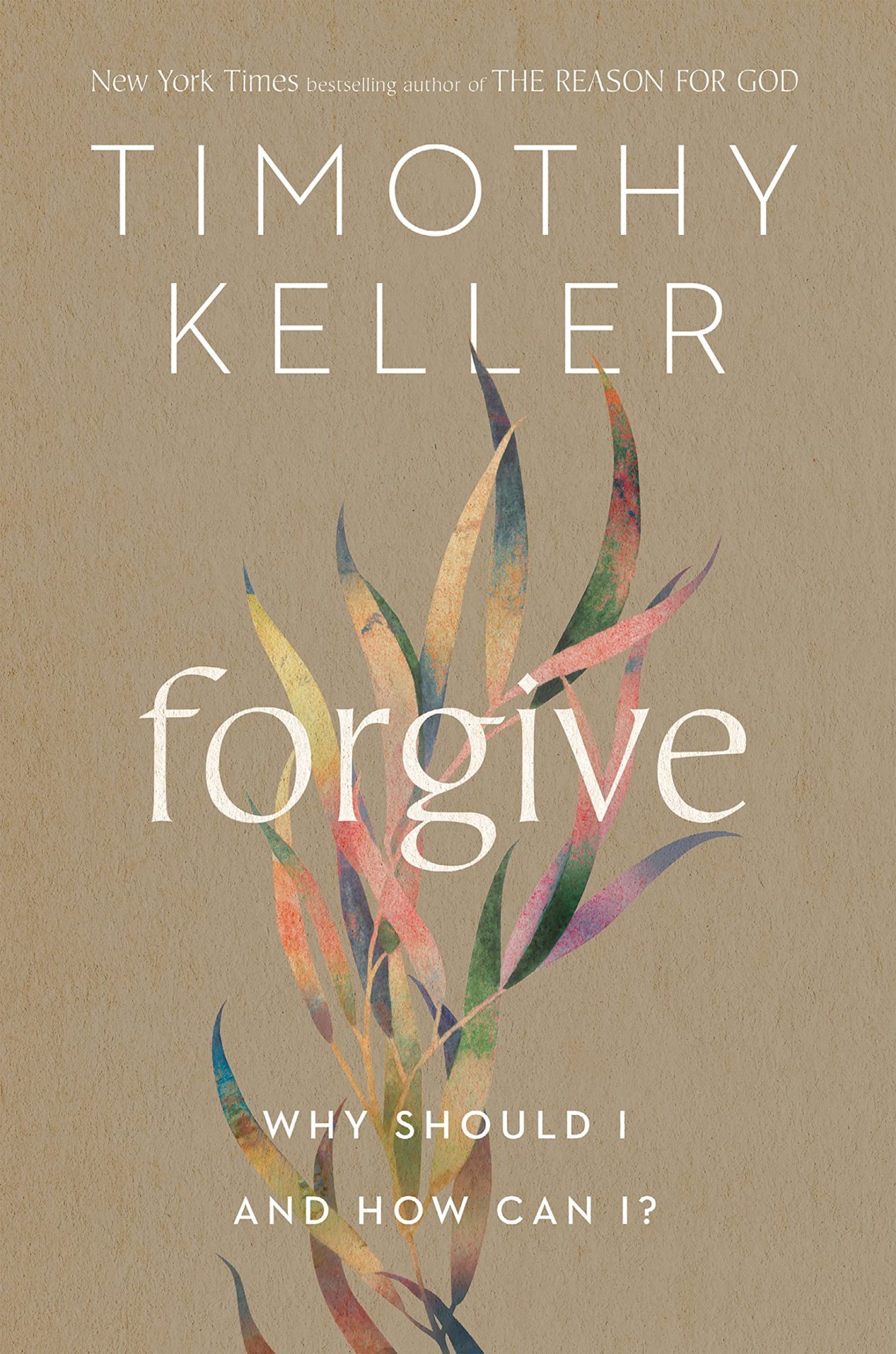If I could have chosen for a topic for Tim Keller to write about, forgiveness would be high on the list. No subject is more central to the Christian life. God’s forgiveness is the greatest need for all who fall short of the glory of God. And, in a broken world, if we’re to love our neighbors as ourselves, we must understand how to forgive and be forgiven.
In his new book Forgive: Why Should I and How Can I?, Keller tackles this subject at last.
While all (or nearly all) recognize the fundamental importance of forgiveness, there’s widespread debate about how to understand forgiveness and live it out. Many in our late-modern age question whether grave offenses should ever be forgiven. Even Christians who know we’re to pray “forgive us our sins as we forgive those who sin against us” struggle to agree on a basic definition. And, as Keller points out, there’s an ongoing discussion about “the apparent contradiction between forgiveness and justice, the sense that we will have to choose one over the other” (xviii).

Forgive: Why Should I and How Can I?
Tim Keller
Pastor and New York Times bestselling author Timothy Keller outlines the reasons why forgiveness has to be a central part of everyone’s lives.
Forgiving anyone in a meaningful way is one of the hardest things a person has to do. If you do not, resentment and vengeance begin to consume you. It is nearly impossible to move past transgression without forgiveness, but few people have the resources and the tools to forgive others fully and move on with their lives. Forgiveness is an essential skill, a moral imperative, and a religious belief that cuts right to the core of what it means to be human. In Forgive, Timothy Keller shows readers why it is so important and how to do it, explaining in detail the steps you need to take in order to move on without sacrificing justice or your humanity.
Defining Forgiveness
One of the strengths of Forgive is that Keller outlines a careful four-part definition of forgiveness that lays the groundwork for discussion (9–10). He summarizes four actions that constitute forgiveness:
1. “[It is] to name the trespass truthfully as wrong and punishable, rather than merely excusing it.”
2. “It is to identify with the perpetrator as a fellow sinner rather than thinking how different from you he or she is. It is to will their good.”
3. “It is to release the wrongdoer from liability by absorbing the debt oneself rather than seeking revenge and paying them back.”
4. “It is to aim for reconciliation rather than breaking off the relationship forever.”
Each component is vital. “If you omit any of these four actions,” writes Keller, “you are not engaging in real forgiveness” (10).
Countering Current Obstacles to Forgiveness
Another strength of Keller’s summary of forgiveness is that it guards against two prevalent obstacles to Christian forgiveness. The first of these obstacles is therapeutic forgiveness, an understanding of forgiveness as a private emotional strategy done for the benefit of the one forgiving (29–31).
Keller’s definition of forgiveness counters therapeutic forgiveness. He argues that forgiveness means absorbing the debt and refraining from revenge. Contra therapeutic forgiveness, forgiveness aims for reconciliation and isn’t merely a private emotional strategy.
Forgiveness aims for reconciliation and isn’t merely a private emotional strategy.
We desperately need Keller’s response to therapeutic forgiveness. Many, if not most, Christian books on forgiveness promote a therapeutic understanding and in so doing redefine a word that is central to the gospel. Keller warns, “The resources for healing relationships and strengthening community are being eliminated by a therapeutic culture (31).”
The second obstacle to Christian forgiveness that Keller counters is that of a new “shame-and-honor culture,” sometimes called “cancel culture.” Keller explains that in the new shame-and-honor culture, being a victim grants status: “The further down the existing social ladder one is, the greater honor is possible” (31). This culture values fragility and outrage and, thereby, disincentivizes forgiveness. After all, if unresolved differences provide a platform for being outraged, forgiving offenses forfeits status. “Forgiveness is seen now as radically unjust and impractical,” Keller writes, “as short-circuiting the ability of victims to gain honor and virtue as others rise to defend them. And so this culture is littered with enormous numbers of broken and now irreparable relationships” (32).
Again, Keller’s response is much needed. Most of us have witnessed social media interactions that have devolved into participants seeking to gain status through victimhood rather than people finding healing.
Pastoral Insights for the Repentant and the Offended
Those processing the complexities of relating to people who’ve hurt them will benefit from the pastoral and practical insights in Forgive. For example, distinguishing worldly sorrow (as in the person who’s sorry he got caught) from godly grief (one who is truly repentant) is one of the most challenging aspects of processing broken relationships. In this context, Keller outlines the distinguishing characteristics of biblical repentance and warns against those who say they’re repentant but who only feel sorry for themselves and seek to manipulate those they hurt:
Self-pity looks like repentance, but it is self-absorption, and that is the essence of sin. . . . Repentance begins where self-pity ends. . . . There is a kind of false repentance that is excessive. The person is filled with loud and intense self-loathing, cries, and tears. Listeners feel compelled to tell them they aren’t that bad, they aren’t that guilty. And this is the very point of such self-flagellation—it tries to pressure others and even God not to accuse but excuse and pardon. The inner logic goes something like this: “If I beat myself up enough, surely this will atone for my sin and no one will ask me for anything else.” (146–48)
Keller also offers convicting insights for how we view those who have offended us:
If a cartoonist wants to make someone look ludicrous, she can create a caricature. She can take something about a person’s face that’s unusual or a bit unattractive and exaggerate it, making it prominent so that the person looks foolish. That’s exactly what your heart does when someone wrongs you. You think of them one-dimensionally, in terms of that one thing they’ve done to you. . . . If somebody has lied to you, you tell yourself “She lied because she is just a liar!” But if you are ever caught in a lie, and someone asks why you lied, you say, “Well, yes, but it’s complicated.” (165)
Should Victims Automatically ‘Pay’ the Cost of Offenses?
Throughout Forgive, Keller rightly emphasizes that victims shouldn’t feel they have the right to harbor bitterness.
Yet, at times, it seems Keller pushes so hard against the tendency to bitterness that he risks becoming unbalanced in ways that are in tension with justice. I’ll give two examples.
First, Keller tells victims that internal forgiveness is unconditional. Regardless of the offense, those offended should always internally pay the cost of offenses. In making this point, Keller summarizes internal forgiveness as having three components: (1) identifying with the wrongdoer; (2) absorbing the debt, that is, inwardly paying the debt of the wrongdoer yourself rather than making him pay it; and (3) willing the good of the wrongdoer (164–71).
The first and third aspects are consistent with biblical teaching. We should all recognize we’re sinners who have been forgiven much. And we should pray for the best for our neighbor, even for those who have offended us. Christians should love their enemies.
But the idea that the offended should automatically pay the debt of the wrongdoers, even when the offender is unrepentant, is problematic. Consider the situation of victims of the worst sorts of violence. Keller advises,
When you are wronged, the perpetrator owes you a debt. . . . Your forgiveness means you bear the cost of what the man has done, rather than him bearing it. There is always a cost to wrongdoing and it must fall on someone. Either the wrongdoer bears it or someone else must (166–67).
Should victims be counseled when processing the wrong done to them that they should inwardly choose to pay the offense of the debt of unrepentant offenders? To be sure, the offended must endure pain without being defined by hatred and bitterness. But to tell victims they must internally pay the cost of unrepentant offenders is neither helpful nor consistent with New Testament examples.
We should pray for the best for our neighbor, even for those who have offended us. Christians should love their enemies.
Paul doesn’t take this approach with Alexander the metalworker (2 Tim. 4:14). Nor does he with the offenses committed against the Thessalonians (2 Thess. 1:3–10). Rather than picturing themselves as paying down the cost of what is done by unrepentant offenders, victims should be advised to proactively show love and not take revenge. Where the cost is concerned, it’s more consistent with Scripture to assure victims that God is just. Turn the matter over to him. The price justice requires for this offense will be paid in one of two ways. Either the offender will repent and believe, in which case Christ paid for the offense. Otherwise, the unrepentant offender will face a just Judge.
Indeed, this is how Peter summarized Jesus’s response on the cross. The Lord didn’t revile or retaliate. He made no threats. He took on himself the penalty for the sins of his people. And where the unrepentant are concerned, he entrusted himself to him who judges justly (1 Pet. 2:21–25).
As an antibitterness strategy, teaching that victims should automatically pay the offenses committed against them regardless of the repentance of the offender may not be effective—it could build bitterness instead. It may also compromise the witness of the church to an onlooking world if we’re reluctant to speak about how offenders will face the wrath of God.
Leave Room for God’s Wrath
This brings us to a second and related area of concern regarding balance. Though Keller does write about God’s wrath at length in Forgive (71–85), he’s cautious about comforting victims with the truth that unrepentant offenders will stand before God. He warns against an attitude that would delight in the thought of an offender facing God’s judgment: “‘Leave room for God’s wrath’ has often been interpreted like this: ‘Yes—leave it to God. God will let them have it! And in a way that you cannot!’” (195).
Christian victims ought not to take sinful pleasure in another’s destruction; instead, Jesus calls us to love our enemies. However, as I have said above, the Bible doesn’t see it as inconsistent with Christian love to rest in the truth that God is a just Judge (Ps. 37; Rom. 12:17–21; 2 Tim. 4:14). A loving Christian who renounces revenge but trusts the justice of a holy God is not bitter or angry. Indeed, trusting in God’s justice should move us to love. Dietrich Bonhoeffer, explaining his compassion for the Nazis who would execute him, wrote from prison, “It is only when God’s wrath and vengeance are hanging as grim realities over the heads of one’s enemies that something of what it means to love and forgive them can touch our hearts.”
Keller counters the idea of victims being comforted by the justice of God, writing, “If we don’t tell God what to do with his wrath but allow him to send it when and where he wills, what does he do with it? In Jesus Christ God comes and takes the penalty of justice himself” (195).
Elsewhere, Keller summarizes, “The message of the prophets, then, is that no amount of human evil and recalcitrance can ultimately stop God’s forgiveness from finding its way to us” (64). While Keller is clear that God’s forgiveness is conditioned on repentance in the larger context of Forgive, such statements should be qualified in the immediate context. Jesus’s forgiveness doesn’t break through for the unrepentant, nor does Christ bear their punishment (John 3:36).
Eyes on King Jesus
Cornelius Plantinga painted the right word picture when he wrote, “Anybody who thinks hard about forgiveness will start a lot more rabbits than he can catch. The topic raises a whole nest of questions, and the good answers will seldom be the easy ones.” In a constructive way, Tim Keller’s Forgive will begin many discussions. He has flushed out any number of forgiveness rabbits to be pursued even if doing so requires a trip into the briar patch. I look forward to engaging further with them in the days to come.
A loving Christian who renounces revenge but trusts the justice of a holy God is not bitter or angry.
As for balance and the difficult situation of grave offenses and unrepentant offenders, perhaps Keller’s book gives this writer a needed push. In my book Unpacking Forgiveness (Crossway, 2008), consistent with the position argued by a number of other theologians, I emphasized forgiveness is conditional. I argued that Christians ought always to have an attitude of forgiveness—that is, we should always offer the gift of forgiveness—but that forgiveness takes place only when the offender is repentant. I remain persuaded by that position. But it isn’t lost on me that some might weaponize an incomplete and distorted understanding of the conditional nature of forgiveness as a license for harboring bitterness and resentment and taking revenge (if only in small ways). Perhaps in that regard, Keller’s work warns those who would weaponize conditional forgiveness.
The best thing that could be said of any book on forgiveness is that it focuses on the cross and King Jesus. This is beautifully true of Forgive. Keller invites the reader to consider Christ, to understand how he atoned for sin, to be moved by his example: “Don’t let yourself be twisted. Take in what Jesus Christ has done, put your little story about what people have done to you in the big story of what he did for you, and you’ll have the power you need to grant forgiveness” (181).
Since Unpacking Forgiveness was published, I’ve spoken and engaged with so many people in my own congregation and with people across the country and on the other side of the ocean. In addition to what I’ve seen as an author and pastor, I’ve experienced betrayal and pain alongside my extended family. Both pastorally and personally, there’s been a lot of forgiveness to unpack. Thinking about those with whom I’ve interacted, including my own family, I wouldn’t hesitate to recommend Keller’s book.

































